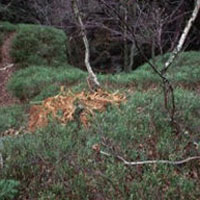health guides
Bilberry
 © Steven Foster
© Steven FosterParts Used & Where Grown
A close relative of American blueberry, bilberry grows in northern Europe, Canada, and the United States. The ripe berries are primarily used in modern herbal extracts.
- Reliable and relatively consistent scientific data showing a substantial health benefit.
- Contradictory, insufficient, or preliminary studies suggesting a health benefit or minimal health benefit.
- For an herb, supported by traditional use but minimal or no scientific evidence. For a supplement, little scientific support.
Our proprietary “Star-Rating” system was developed to help you easily understand the amount of scientific support behind each supplement in relation to a specific health condition. While there is no way to predict whether a vitamin, mineral, or herb will successfully treat or prevent associated health conditions, our unique ratings tell you how well these supplements are understood by the medical community, and whether studies have found them to be effective for other people.
For over a decade, our team has combed through thousands of research articles published in reputable journals. To help you make educated decisions, and to better understand controversial or confusing supplements, our medical experts have digested the science into these three easy-to-follow ratings. We hope this provides you with a helpful resource to make informed decisions towards your health and well-being.
This supplement has been used in connection with the following health conditions:
| Used for | Amount | Why |
|---|---|---|
Retinopathy | 360 to 600 mg daily of an extract standardised for 25% anthocyanosides | Bilberry extract has been shown to strengthen blood vessels in the eye and improve vision in people with diabetic and hypertensive retinopathy. |
Type 1 Diabetes | 160 mg twice daily of a herbal extract containing 25% anthocyanosides | Bilberry may lower the risk of some diabetic complications, such as diabetic cataracts and retinopathy. |
Type 2 Diabetes | 160 mg two to three times daily | Bilberry may improve glucose metabolism and lower the risk of some diabetic complications, such as diabetic retinopathy. |
Atherosclerosis | Refer to label instructions | Bilberry has been shown to prevent platelet aggregation. |
Cataracts | Refer to label instructions | Bilberry is high in flavonoids called anthocyanosides, which may protect both the lens and retina from oxidative damage and reduce the risk of cataracts. |
Diarrhoea | Refer to label instructions | Bilberry has been used traditionally in Germany for adults and children with diarrhoea. Only dried berries or juice should be used—fresh berries may worsen diarrhoea. |
Glaucoma | 60 mg twice a day | In a preliminary trial, supplementing with anthocyanins (flavonoids found in bilberry) improved symptoms in people with normal-tension glaucoma. |
Lymphedoema | Refer to label instructions | Because coumarin, hydroxyethylrutosides, and diosmin are not widely available in, flavonoids such as anthocyanosides (from bilberry), have been substituted by doctors. The effects of these flavonoids against oedema has not been well studied. |
Macular Degeneration | Refer to label instructions | Supplementing with bilberry may help prevent and treat early-stage macular degeneration. |
Night Blindness | Refer to label instructions | Bilberry is high in flavonoids that speed the regeneration of the pigment used by eye for night vision. Supplementing with bilberry has been shown to improve dark adaptation in people with poor night vision. |
Traditional Use (May Not Be Supported by Scientific Studies)
The dried berries and leaves of bilberry have been recommended for a wide variety of conditions, including scurvy, urinary tract infections, kidney stones, and diabetes. Perhaps the most sound historical application is the use of the dried berries to treat diarrhoea. Modern research of bilberry was partly based on its use by British World War II pilots, who noticed that their night vision improved when they ate bilberry jam prior to night bombing raids.1
Copyright © 2024 TraceGains, Inc. All rights reserved.
Learn more about TraceGains, the company.
The information presented by TraceGains is for informational purposes only. It is based on scientific studies (human, animal, or in vitro), clinical experience, or traditional usage as cited in each article. The results reported may not necessarily occur in all individuals. Self-treatment is not recommended for life-threatening conditions that require medical treatment under a doctor's care. For many of the conditions discussed, treatment with prescription or over the counter medication is also available. Consult your doctor, practitioner, and/or pharmacist for any health problem and before using any supplements or before making any changes in prescribed medications. Information expires December 2024.


 We are proud to announce that
We are proud to announce that  As the market evolves, customers increasingly request a wider variety of omega-3 options for their lipid...
As the market evolves, customers increasingly request a wider variety of omega-3 options for their lipid...  Maintaining healthy glucose levels is crucial for preventing metabolic conditions like diabetes,...
Maintaining healthy glucose levels is crucial for preventing metabolic conditions like diabetes,...  Looking at formulating a new vitamin blend? Discover
Looking at formulating a new vitamin blend? Discover 







































